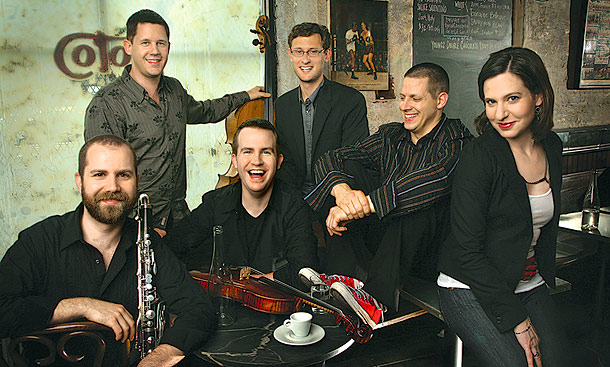
When The New Yorker called Eighth Blackbird “fiendishly good” in 2000, it seemed likely that the high-profile endorsement would ignite a cascade of local gigs. After all, the new music sextet rehearses in a Ravenswood studio, and its members serve as artists in residence at both the University of Chicago and the University of Richmond. But seven years, six albums, and scores of performances later, Eighth Blackbird still remains largely unknown in its own town.
Unraveling this enigma is fairly simple. First of all, New York owns the contemporary classical market and offers more venues. Second, to the average listener, contemporary music is, well, a little scary.
“People think it’s all squeak-fart music,” says Lisa Kaplan, Eighth Blackbird’s pianist. “They think it’s all atonal. They think it can’t be fun. That it can’t be beautiful.” Kaplan and her fellow musicians—who range in age from 28 to 36—aim to change that thinking when they launch a high-profile series of local shows, starting at the Harris Theater on October 23rd.
The sextet have traveled in a pack since meeting in the early 1990s as students at the Oberlin Conservatory of Music in Ohio. At the time, a young and virtuosic teacher-composer named Tim Weiss wanted to put together a contemporary ensemble with six of his students. The group—with only a small change of personnel—migrated to graduate school at Northwestern’s School of Music and eventually became Eighth Blackbird. “The chemistry was perfect,” says Weiss, who still teaches at Oberlin. (A slot with his contemporary sextet is now one of the most coveted positions at the conservatory.) “They were all talented and they all had a great amount of enthusiasm for contemporary music.”
By contemporary music, Weiss means anything composed in the past 25 years. But Eighth Blackbird confines itself largely to music written in the past decade. Its enthusiasm for young and eclectic composers like Jennifer Higdon and Daniel Kellogg explains only part of its critical success. Unlike most chamber ensembles, whose members sit erect in stiff chairs, glued to the scores on their music stands, Eighth Blackbird is fun to watch. The players memorize nearly every note, which frees them to move across the stage and even add subtle elements of choreography (with a little help from a Hubbard Street dancer). As the musicians interact, novice audience members start to understand how instruments work in tandem and what stories lie beneath the composer’s notes.
“It’s not thorny or super-intellectual,” says Weiss, who sees particular appeal for the iPod generation. It’s the closest thing the classical world has to Radiohead: Everything they play crosses over with everything else.
The composers who work with Eighth Blackbird understand this, too. For their upcoming program at the Harris Theater, interactive digital artist Danny Rozin and composer Tamar Muskal, a husband-wife team, are collaborating with Eighth Blackbird for a new mixed-media piece called Mirrors. A large screen will project three distinct digital effects of Eighth Blackbird’s movement during its live performance. The different reflections will, in a sense, become the seventh performer.
“It’s not a gimmick,” Kaplan says in defense of that and other program pieces, such as Thierry De Mey’s Musique de Tables, in which the musicians slap, swish, and tap wooden boards using their fingers and knuckles. “We’re trying to convince you to like it.”
Eighth Blackbird’s upcoming concerts finally give the ensemble that chance. “We’re being very selective with the kinds of organizations we aggressively go after and invite into the Harris,” says Michael Tiknis, the Harris Theater’s managing director. The biggest challenge is convincing Chicagoans that they don’t have to be afraid of the avant-garde.
The ensemble’s early mentor Tim Weiss doesn’t believe the Harris will have a problem. “If anybody can play in a larger venue and try to attract a large audience, then I think Eighth Blackbird can do it.”
Eighth Blackbird plays the Harris Theater (205 E. Randolph Dr.; 312-334-7777, harristheaterchicago.org) on Oct. 23rd, then returns in 2008 on Jan. 26th and May 29th. The ensemble also performs a series of 2008 dates through the U. of C. Go to contempo.uchicago.edu for details.
Photograph: Luke Ratray/Courtesy of 21C Media



